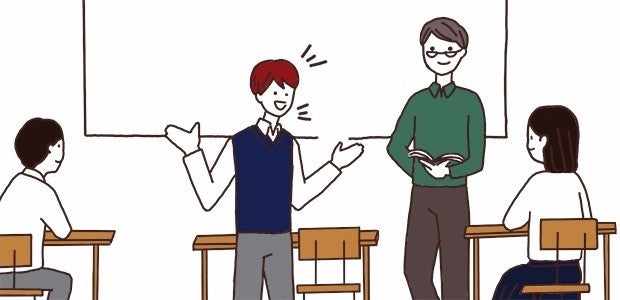小・中#15-2: “What subject do you like?” 「好きな科目は何ですか?」(後)
前回は、「科目」というトピックについて、指導者のモデル発話に続く「児童への最初の問いかけ」について考えました。
実際の授業でもよく使われる “How about you?” というフレーズでは、特に直前の指導者の発話が長い場合など、児童が何についてたずねられているのか分からないことがあります。 “How about you?” は「あなたはどうですか?」と問いかける時に便利なフレーズである一方で、状況によって具体的な問いを添えるなどの配慮が必要であることに触れました。
小・中#15-1: “What subject do you like?” 「好きな科目は何ですか?」(前)
今回は、「科目」について Small Talk の内容をどのように展開させることができるかについて見ていきます。
まず指導者が次のように既習の表現を含めて伝えます。
T: Look at the timetable of our class. We study many subjects. On Mondays, we have [study] Japanese, math, science, English, and home economics. I like music. I like playing the recorder. On Mondays, we don’t have music. We have music on Tuesdays. I want to enjoy the music class.
【展開例1】
児童に「好きな教科は何か」とたずねます。「理由を添えて話す」ことを自然に意識するようになって欲しいので、「さらに質問」を続けます。話題を広げることに悩んでしまう児童も多いことから、できるだけ “Why?” とたずねて児童の想像力に任せるのではなく、最初は指導者の方から「考えるヒント」を提示していきます。
T: What subject do you like, S1?
S1: Social studies.
T: You like social studies. Do you enjoy studying history? Or geography? Geography … do you enjoy studying about, for example, places and environments?
S1: I like history.
T: What do you find interesting about history? [What is interesting about history? / Why is it interesting to you?]
S1: I can study about people … 昔の?
T: Oh, you enjoy leaning about the people of the past, … the people who lived a long time ago?
S1: Yes, yes.
T: S1, can you repeat? “I enjoy learning about the people of the past.”
S1: I enjoy learning about the people of the past.
T: Well done. So you like history. I didn’t know it. Actually I enjoy reading history books. History is interesting. Thank you, S1.
小学校段階では未習の表現が出てくることがあります。さらに「小学校の学習事項には含まれない表現」を児童が言いたがることもあるでしょう。そういう場合でも、その表現を提示することに過敏になる必要はありません。
児童が伝えたいことが分かったら、それを表す表現を聞かせ、一度でもリピートさせて「言えた!」という達成感につなげることが大切です。意外に、そういう時に繰り返した表現が、児童の耳に、記憶に、残っているものです。
【展開例2】
上の1の展開よりも、児童の既習表現を用いた問いを繰り返すことにより、「今まで習った表現でたくさん伝えられることがある」と児童に気づかせることを意図しています。
T: How about you, S2? What subject do you like?
S2: P.E.
T: You like P.E. Do you enjoy P.E. classes?
S2: Yes.
T: What sport [activity] do you like in P.E. classes?
S2: I like dodge ball.
T: Dodge ball! You like dodge ball. Can you throw a fast ball? (ジェスチャー)
S2: No.
T: You can’t throw a fast ball? Maybe you can throw a good ball. Thank you, S2.
【展開例3】
前の児童(S2)との話の内容を受けて、次の児童(S3)にたずねます。S3 も S2 と同様にドッジボールが好きで、体育も好きあれば、さらに S2 への問いと同じものを繰り返して、二人の答えに違いがあるかを引き出すことができます。しかし以下では、S3 が、ドッジボールは好きでも体育は好きではなかったため、基本の質問である “What subject do you like?” 「どの教科が好きですか」に一度戻ってから続けます。今回の Small Talk のトピックを大切に維持するねらいがあります。
T: Hi, S3. S2 likes dodge ball. Do you like dodge ball?
S3: Yes.
T: Oh, you like dodge ball. Do you like P.E.?
S3: No.
T: No, you don’t? What subject do you like, then?
S3: I like math.
T: You like math! I thought math was very difficult when I was in elementary school. You like math, S3. Tell me more. What do you like to do in math classes?
S3: 計算 …?
T: You like figures … calculations. (黒板上などで計算してみせる)
S3: Yes.
T: That’s great! Thank you, S3.
もちろん、児童との話がどんどん展開して、最初のトピックを離れることもあります。しかしトピックを提示して Small Talk を行う場合には、他の児童が行う対話を聞きながら、「自分の好きな教科は・・・」と考え、言ってみるのを楽しみにしている児童もいるはずです。
せっかく指導者によるモデルで「自分も使える表現」を想起させていますから、できる限り、思い出した表現を使う経験をさせたいものです。

【展開例4】
「英語で時間割を説明できるようになっている」ことを生かして、「3ヒントクイズ」を行います。ここでのねらいは、「何曜日にその教科の授業があるか」、「自分はその教科を好きな理由」、「その教科の特徴」について、英語で伝えることです。”We have this class on Wednesdays.” のように、意図した教科を代名詞で置き換えて言う形には初めて出合うかもしれません。最初に指導者がモデルを聞かせます。
T: Now, everyone, think of the subject you like. Let’s make a “three-hint” quiz. For example, we have this class on Wednesdays. We go to the special room. I can sing well. What subject?
Ss: Music!
T: Yes, I like music. Now, your turn.
以下のように、様々な既習表現を組み込むこともできます。
S4: We study this subject on Mondays, Tuesdays, Wednesdays, and Fridays. I like singing songs. I can sing well!
Ss: Music!
S4: No. We study this on Mondays, Tuesdays, Wednesdays, and Fridays. We have only one music class a week. … OK, the last hint. I enjoy talking to many people.
Ss: English!
S4: Yes, I like English. I like singing English songs!
ヒントを工夫して言う児童も出てきそうです。様々な既習表現を組み込むこともできます。
S5: We have this on Tuesdays and Fridays. We don’t have this in the afternoon.
Ss: P.E.!
S5: No. … Please listen. I like 武将!
Ss: Social Studies!
S5: Yes, that’s right.
Ss: But we have Social Studies on Mondays too!
ヒントとして内容的に無理があっても、児童同士が英語を聞いて一生懸命理解し、考え、最後にヒントに納得できれば盛り上がります。ヒントに異議がある場合などは、「自分ならどう言うか」を考えさせ、英語で表してみるように促すとよいでしょう。
************************************
「好きな教科」を相手に伝えるときなど、毎回その理由や詳細などを添えて話すかどうかといえば、そうではない場合ももちろんあります。
ですが、「相手に少しでも分かりやすいように伝えよう」、「自分のことをもっと分かって欲しいから伝えよう」という気持ちがあれば、単に “I like social studies.” と言うだけでは終わらないものです。そうした経験を積むことが、コミュニケーション能力を育成する外国語の教科特徴であり、授業の中でも大切に心がけていきたいものです。




